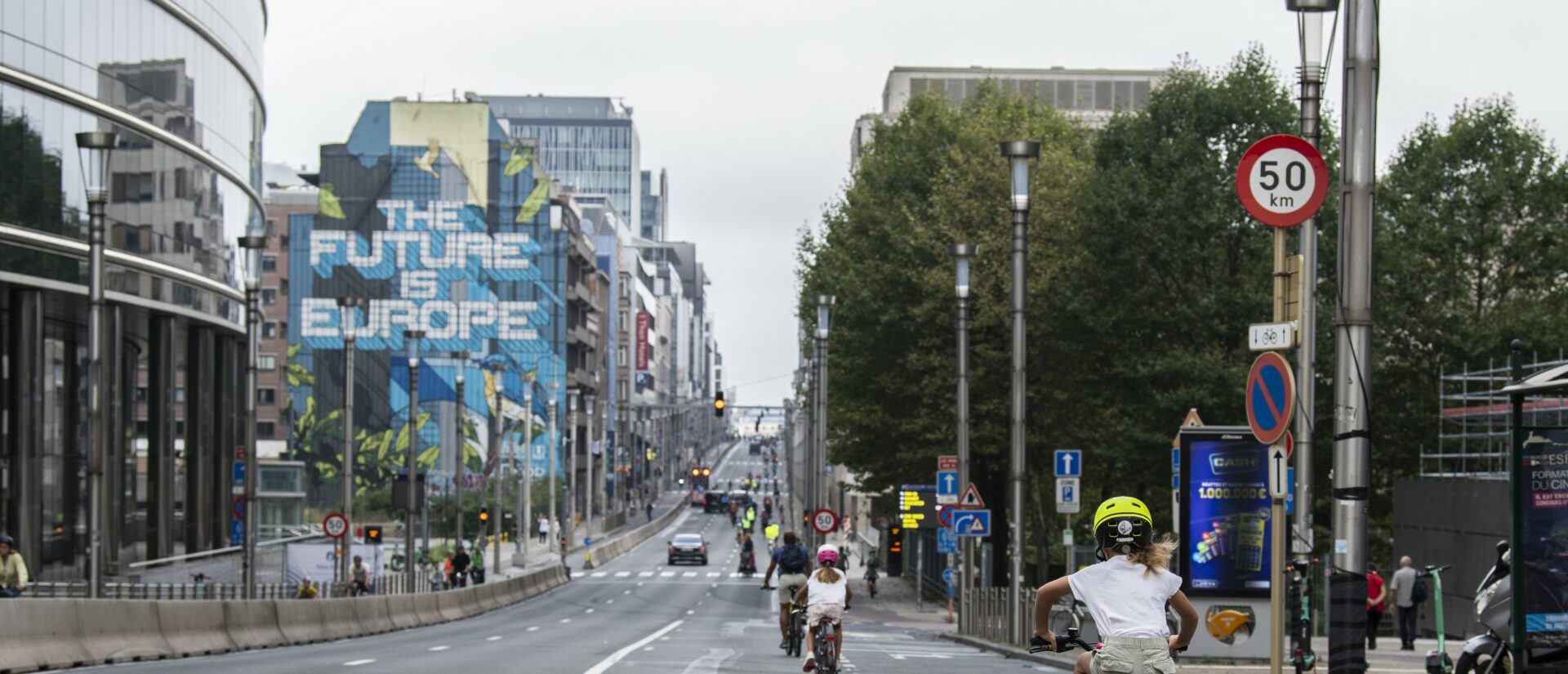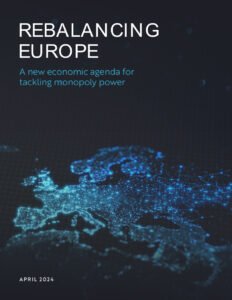
Rebalancing Europe
A CSO economic agenda to tackle monopoly power
As the EU heads to elections in June, Europeans are feeling the pressure from overlapping crises. Extreme corporate power is the common denominator driving or worsening these crises. Corporate lobbies are already pushing for a competitive agenda prioritising deregulation and market concentration. Yet, the EU will only protect people and the economy by limiting corporate power. SOMO and partners have put together an agenda to put anti-monopoly at the heart of EU action.
Monopoly power is hurting people across the EU
The EU economy is increasingly marked by high levels of concentration(opens in new window) . We are seeing a handful of corporations gaining so much power that they have insulated themselves from competitive or consumer pressures. This power comes at the expense of workers, consumers and democracy.
-
 Rebalancing Europe – a new economic agenda for tackling monopoly power (pdf, 2.58 MB)
Rebalancing Europe – a new economic agenda for tackling monopoly power (pdf, 2.58 MB)
This became clearest during the unprecedented turbulence we have experienced in the past five years. COVID, climate change and war have created countless human loss and suffering. They also sent shockwaves through the globalised market system. This turbulence allowed companies with market power to hike up prices. The results were skyrocketing energy and food prices and record-breaking profits for a handful of companies.
Take for instance the top food commodity traders, who in the past three years have tripled their profits. ADM, Bunge, COFCO, Cargill and the Dutch Louis Dreyfuss Company together control between 70 and 90 per cent of the global trade in commercial grains. In a time of volatility, these five companies expanded their profit margins, leading to a higher cost of living and food instability worldwide.
In the past months, EU politics have been dominated by protests from farmers across the continent. And while the EU was quick to drop environmental and social protection rules in response, it has not taken heed of the farmers’ cries of how trade deals and big retailers are squeezing them. In Germany, for instance, it is estimated(opens in new window) only an average of 14% of the price consumers pay ends up with the farmer producing it.
Workers are also feeling the heat. Despite low levels of unemployment, analysis from the European Central Bank has shown(opens in new window) that the wage share – the value of total salaries relative to corporate profits – has gone down. In the Netherlands, for instance, SOMO research has found that while shareholder remuneration increased by 500% over the past 20 years, wages increased only by 50%.
There is no reason to assume the Dutch situation is an exception. In fact, European trade unions(opens in new window) have found that across the EU real salaries decreased just as real profits increased.
In the background, Big Tech’s pursuit of incessant growth has enabled the spread of disinformation and hate speech. All while diverting much-needed funding from journalism and hurting media plurality. Big Tech’s profits are the counterpart to a toxic digital public sphere.
The mix of economic pain with digital toxicity has been a boon to the far-right political forces(opens in new window) .
Competitiveness shielding for
de-regulation
As we go towards European Parliament elections, many multinationals are using this time to entrench their power and corporate profits. Corporate lobbyists are asking for environmental and social protections to be slashed and anti-trust policies to be softened. At the same time, they ask for more public subsidies and other measures to help already powerful corporations grow even stronger. All in the name of so-called competitiveness.
This narrative seems to be taking hold in the EU institutions and member-states as in the past months we have seen key policy proposals such as the corporate sustainability due diligence directive (CSDDD) and the platform workers directive watered down. Key environmental protections(opens in new window) suffered an even worse fate
This is a false solution. It will simply entrench corporate power and make us unable to respond to the challenges of climate change and fast technological change.
An alternative vision: a rebalanced economy to tackle monopoly power
Together with partners, we have an alternative vision that tackles monopoly power for the benefit of all. Our six priorities are:
1 Replace the EU’s outdated approach to competition policy with a more flexible paradigm that incorporates a greater variety of economic and non-economic objectives and a wider set of stakeholders. This new paradigm should promote specific political economic outcomes including a robust democracy, a safe, open and interoperable digital ecosystem, an innovative and resilient economy, and a free and pluralistic media;
2 Introduce a cross-commission mandate to use all available means to tackle the concentration of economic power and control in the EU, as well as Europe’s dangerous dependence on concentrated supply chains abroad. This should include greater coordination and coherence of competition, trade, industrial, data protection, digital, labour, consumer protection and tax policies and enforcement;
3 Grant the EU Commission new powers to investigate monopolistic control and conduct across entire industries and not just specific companies, including the ability to swiftly impose remedies and sanctions where necessary. This should broadly mirror existing market investigation regimes in the United Kingdom and Germany, as well as the “New Competition Tool” previously proposed by the Commission;
4 Deploy more bright-line rules and structural remedies in competition investigations, including ordering corporate divestments, prohibiting anti-competitive mergers, and banning outright exploitative corporate behaviours and the business models that support them. Where necessary this should include updating relevant legislation and guidelines, including Regulation 2003/1 and the EU Merger Regulation;
5 Maximise the potential of industrial policy and state aid to create a more diverse and balanced economy, while preventing them from being used to facilitate greater economic concentration and the emergence of national or European “champions”. Where state aid is granted to dominant corporations, this should be accompanied by clawback provisions and strict limitations on executive pay, share buybacks, dividends and acquisitions. Subsidies that fund the extraction, production and consumption of fossil fuels should be banned outright;
6 Empower citizens and civil society to participate in both the development and enforcement of competition policy, including merger and antitrust investigations, proceedings before EU courts, enforcement of related legislation including the Digital Markets Act, and initiatives to reform or update competition law. This should include making it easier for civil society and consumer representatives to receive “interested third party” status in competition proceedings.
Do you need more information?
-

Margarida Silva
Researcher
Signatories to the manifesto
Related news
-
 The power to extract value from the value chainPosted in category:Long read
The power to extract value from the value chainPosted in category:Long read Rodrigo FernandezPublished on:
Rodrigo FernandezPublished on: -

-
 Taking Stock: 50 Years of prioritising shareholdersPosted in category:Long read
Taking Stock: 50 Years of prioritising shareholdersPosted in category:Long read Rodrigo FernandezPublished on:
Rodrigo FernandezPublished on:



